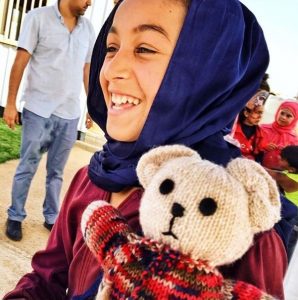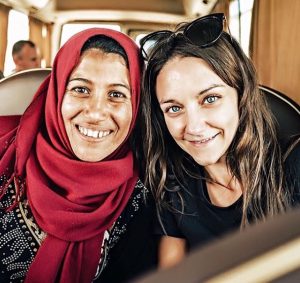Cuddly toys show Syrian children they’re 'knot’ forgotten
Global crochet movement brings comfort to Middle East refugees
A “global crochet movement” is distributing handmade toys to displaced children in Syria and Iraq to remind them that they are loved and haven’t been forgotten.
Aptly named Knot Forgotten, the movement encompasses more than 300 toymakers spread across more than 30 countries.
Run by Open Doors Australia and Open Doors New Zealand, the hand-crocheted or knitted toys are distributed to children who have fled from conflict. Many of them are refugees or internally displaced in their home country.
Open Doors has been serving the persecuted church since 1955. And today, it works in 70 of the hardest places on the planet to follow Jesus.
Knot Forgotten aim “to bring each child a cuddly friend in times of loneliness or fear” as a tangible expression of Jesus’ love. More than 1400 toys have been donated through the movement since August 2017.

Justine Shapiro, who heads up Knot Forgotten, began crocheting while she was battling a severe eating disorder, which left her hospitalised for years.
Although raised in a Christian home, Justine describes her faith as a teenager as being “head-knowledge but not a lot of heart knowledge.”
Plagued by insecurity and anxiety, she battled with anorexia nervosa and eventually turned away from her faith at the age of 16, substituting drugs and alcohol for relief.
Justine describes herself during that time as “existing but not alive”.
Justine describes herself during that time as “existing but not alive”.
After a chance encounter with someone from Open Doors at her parents’ church, Justine became aware to the plight of the persecuted church for the first time.
Over the next year, Justine says she felt as though God took a hold of her “by the scruff of the neck.”

She recommitted her life to Christ and took a trip to the Syrian border with Open Doors to run the Muskathalon – a marathon to raise funds for the persecuted church.
Meeting with persecuted Christians changed her deeply.
“I left with a radicalised faith,” Justine says. “The Christian that I used to be never saw Jesus’ grace – I only saw condemnation. I would therefore try to do anything to make me happy.
“Through the persecuted church, I’ve realised that happiness cannot be found within yourself. It can’t be found in anything the world has to offer, and it definitely can’t be a subject of your circumstances. True happiness can only ever really be found in Jesus.”
Justine explains how meeting Christians who had lost everything for their faith but still had so much joy changed her whole life.
“I’d spent most of my life constricted by my own fear and my own controlling nature,” Justine says. “I hadn’t really given God an inch to move because I wanted to be in control of everything. And when you go to the Middle East, you’re in control of nothing. It’s such a volatile area; things can change. It’s so far outside of my comfort zone – and that’s where I really learned to trust Jesus.”
“When you go to the Middle East, you’re in control of nothing … It’s so far outside of my comfort zone – and that’s where I really learned to trust Jesus.”
During the trip, Justine stayed in a monastery in Zahle in Lebanon, where the team distributed the first of Knot Forgotten’s handmade toys at a school for refugee children.
Her journal entry from that night reads:
9pm, May 14 2017
Sitting on the roof of the monastery we’re staying in, looking out on a crazy sea of lights, knowing that Syria is just over the mountain … Syria is just around the corner and I can definitely hear gunshots, but it is has just become so clear to me and is increasingly becoming clearer to me, that when you have Jesus you have nothing to be afraid of. When you become a follower of Christ, you become part of a family. I’m starting to learn that I don’t need to try to be someone else to gain acceptance, because in Christ, I’m enough.
Now, Justine oversees the global movement of Knot Forgotten, a position she never could have imagined.
“God’s ways are so much higher than ours,” she says. “His plan will be good, it will be perfect.”
Email This Story
Why not send this to a friend?


